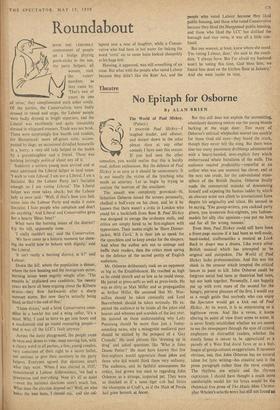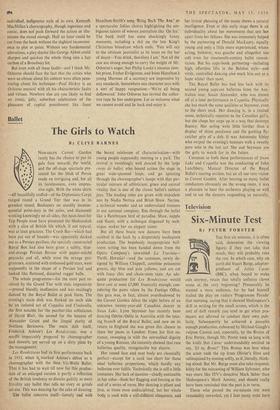Theatre
No Epitaph for Osborne
By ALAN BRIEN The assault was completely provoked—St. Sebastian Osborne issued the arrows personally, chalked ,a bull's-eye on his chest, and let it be known that there wasn't a critic in London who could hit a backcloth from Row B. Paul Slickey was designed to enrage the orchestra stalls, and critics are simply hired to be first-nighters with typewriters. Their motto might be 'Have Dinner- jacket, Will Cavil.' It is their job to speak for the speechless and to keep awake for the sleepers. And when the author sets out to outrage and baffle their readers, then the critics must spring to the defence of the sacred purity of English audiences.
Mr. Osborne deliberately took on an opponent as big as the Establishment. He reached as high as he could stretch and as low as he could stoop. He jeered at press-serfs as well as press-lords. He was as dirty as Max Miller and as propagandist as Arthur Miller. He assumed that Mr. Mac- millan should be taken comically and Lord Beaverbrook should be taken seriously. He ex- pected the audience to be inside all the jokes and hoaxes and wheezes and scandals of the last year. He insisted on them understanding why Lady Poontang should be more than just a funny- sounding name, why a misogynist mediaeval peer should be excited by the prospect of a 'Gay Crusade.' He used phrases like 'dressing up in drag' and asked questions like 'Who is John Deane Potter?' He must have known that few first-nighters would appreciate these jokes and those who did would think them very unfunny.
The audience, and its faithful amanuenses the critics, had grown too used to regarding John Osborne as a strange, imported pet. They were as shocked as if a tame tiger cub had bitten the champion at Cruft's, as if the Shah of Persia had gone berserk at Ascot. But this still does not explain the unremitting, relentlessly damning notices nor the young bloods barking at the stage door. Too many of Osborne's satirical whiplashes moved too quickly for those tired old eyes—they heard the crack, though they never felt the sting. But there were also too many passionate drubbings administered with a heavy-handed, over-explicit fury which embarrassed whole battalions of the stalls. The audience reacted predictably—resentful at an author who was one moment too clever, and at the next too crude, for the conventional atmo- sphere of the British theatre. Osborne finally made the commercial mistake of denouncing himself and exposing the human ladder by which an obscure actor can climb to international fame despite his originality and talent. He seemed to be saying, 'You gossip-writers, you cocktail party givers, you inveterate first-nighters, you fashion- models for silly chic opinions—you put me here and for all the wrong reasons.'
Even then, Paul Slickey could still have been a front-page success if it had been as well-made, hand-tooled, craftsmanlike a musical as Look Back in Anger was a drama. Like every other British musical which has attempted to be original and outspoken, The World of Paul Slickey lacks professionalism. And this was the chink in the armour which tempted the critical lances to joust to kill. John Osborne could be forgiven social bad taste or theatrical bad taste, but not both together. Personally, I can happily put up with even more of the second for the hungry, perverse pleasure of the first. I would say as a rough guide that anybody who can enjoy the Spectator would get a kick out of Paul Slickey. At its worst, it is as entertaining as a highbrow revue. And like a revue, it keeps altering its point of view from scene to scene. It is never firmly established whether we are meant to see the newspapers through the eyes of cynical employees or distrustful readers, whether the stately home is meant to be appreciated as a parody of a West End ducal farce or as a bur- lesque of gossip-column exaggerations. It becomes obvious, too, that John Osborne has no natural talent for lyric writing—his creative unit is the prose paragraph rather than the verse couplet. The rhythms are erratic and the rhymes capricious. I should have thought a much more comfortable model for his lyrics would be the rhetorical free prose of The Music Man. Christo- pher Whelen's eclectic score has still not found ita indiVidual, indigenous style of its own. Kenneth MacMillan's choreography, though ingenious and comic, does not push forward the action or illu- minate the mood enough. Half an hour could be cut from the book without the slightest inconveni- ence to plot or point. Without any fundamental alterations, a play-doctor like George Abbot could sharpen and quicken the whole thing into a fair carbon of a Broadway hit.
But even with all these faults—and I think Mr. Osborne should face the fact that the critics who were so obtuse about his content were often pene- trating about his technique—Paul Rickey is an Osborne musical with all his characteristic faults and virtues. Nowhere else are you likely to find an ironic, jolly, suburban celebration of the pleasures of capital punishment like Janet Hamilton-Smith's song 'Bring Back The Axe,' or a spectacular follies chorus highlighting the am- biguous talents of women journalists like 'On Ice.' The book itself has some shockingly funny moments, including a skit on the late King's Christmas broadcast which ends, 'You will say to the ultimate journalist as he leans on the bar of deceit—You drink, therefore I am.' Not all the cast are strong enough to carry the weight of Mr. Osborne's anger, but Philip Locke's sinuous zom- bie priest, Father Evilgreene, and Irene Hamilton's young Merman of a secretary are impressive by any standards. Somewhere one character says with a sort of happy resignation—We're all being deflowered.' John Osborne has invited the collec- tive rape he has undergone. Let us welcome what we cannot avoid and lie back and enjoy it.



































 Previous page
Previous page